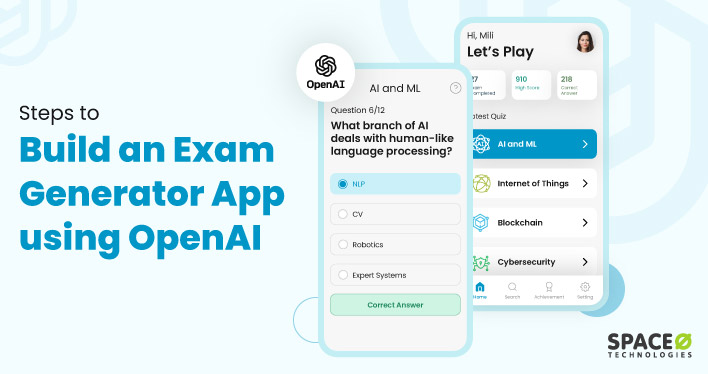Want to create a custom exam generator app with unique features?
But not sure about how to proceed further.
You have landed on the right blog.
Developing an exam generator app using OpenAI can generate a large number of exam questions quickly and efficiently enabling to automate the process of exam generation
If you are wondering how to create an exam generator app using OpenAI to leverage the opportunity, then keep reading this blog.
Since we are a leading OpenAI powered app development company, we know what goes into developing an exam generator app. With research and help from our experienced AI app developers, we have curated this guide to walk you through the process of developing a test app.
Let’s dive into the blog.
Table of Contents
Creating an Exam Generator App Using OpenAI in 6 Steps
Here are the 6 steps to develop the exam generator app using OpenAI.
Understand the Requirements for Exam Generation App
If you want to create an exam generator app, market research your audience, competitors, and their needs before developing an exam generator app. When doing market research for your app and identifying the competitors, make a list of your requirements by considering the below points:
- Type of exam you want in your app: This can include multiple-choice, true/false, short answer, and essay questions.
For example, multiple-choice questions will require a dataset of questions along with several answer options, while an essay question will require a dataset of open-ended questions.
- The subject areas or topics the app will cover: This can include specific subjects such as math, science, history, or language. Considering the subject area will influence the type of data that you will need to train the model on.
For example, an app that covers math will require a dataset of math questions, while an app that covers history will require a dataset of history questions.
- The difficulty level of the questions: Consider varying difficulty levels, such as basic, intermediate, and advanced. It is important to consider the difficulty level of the questions because it will help to ensure that the app is useful for a wide range of users.
For example, an app that only generates basic questions may not be as useful for advanced students.
Once your requirements are clear and you know the type, subject, difficulty level, and target audience, difficulty level, prepare a dataset of your subject area.
- Type of exam you want in your app: This can include multiple-choice, true/false, short answer, and essay questions.
Consult an AI App Development Company to Develop Exam Generator App
Consulting an AI app development company to develop an exam generator app can save you time and resources, and can ensure that the exam generator app is developed as per requirements.
By leveraging the technical experience of an AI app development company, you will create a feature-rich and interactive exam generator app.
But how do you choose the right AI app development company?To choose the right mobile app development service provider for your project, you need a company that has:
- A strong track record of developing AI-powered apps and experience using OpenAI
- Good understanding of the requirements and features that are needed for an exam generator app, as well as the necessary skills and tools to build and deploy the app
- Understands the necessary skills and tools to build and deploy the app
- Check the testimonials and know the pricing model of app development companies
Researching all the above points helps you to choose the right AI app development company for your project. So, once you select the company, the company will understand your specific needs and requirements, and use this information to design and build an exam generator app.
Ready to Develop Your Custom Exam Generator Application Using OpenAI?
Discuss your requirements to build a scalable and bug-free exam generator app.

In case you are planning to hire a dedicated app developers team, you can check their presence on Clutch, Upwork, and Toptal. Or check this detailed guide on how to find and hire skilled app developers. Before you hire a team of developers, ensure to check their portfolios, work experience, reviews, and feedback from the clients.
If you do not want to do all this tiresome work, you can also consider Space-O Technologies as your technological partner. We have experience building more than 4400+ mobile app solutions and working with over 1200+ clients across the globe.
Train the OpenAI Model on a Dataset of Exam Questions and Answers
Once you get in touch with an AI app development company, the development team will train the OpenAI model to generate exam questions and answers. If you have already provided a dataset, ensure that the dataset is large enough to train the model effectively. However, the dataset can be collected from various sources such as textbooks, online resources, or past exams.
The AI developers cleans, formats, and preprocesses the data before using it to train the model. After formatting datasets, the AI developers will fine-tune the OpenAI GPT-3 model on the prepared dataset. This means feeding the model with the input data and adjusting the output as per the context of the data. Once fine-tuned, the model will learn the relationships between exam questions and answers.
Implementing UI for Generating Exam Questions
Once the model is trained, the UI/UX designers design the UI that enables the users to customize exams and generates new questions. The team designs an interface in a way that allows users to customize the exams by selecting subject area, difficulty level, new exam generation, and view the results.
Using a web framework like Flask or Django, and designing tools like Adobe XD, the team designs the interface in a way that is responsive and accessible on all devices. Once developed, the UI is integrated with the trained OpenAI model enabling the generation of new exams and viewing of the result from the interface.
Testing and Debugging the Exam Generator App
Once the app is designed and developed, the QA team tests the products.QA team identifies and fixes any errors or bugs in the app to ensure that it functions properly and meets the needs of its users.
When testing the app, the testers consider of the following points:
- Tests on different devices and browsers to ensure compatibility and function properly on all the platforms.
- Checks if the generated questions provide relevancy and accuracy
- The app performance is tested in different conditions such as high traffic, and large data sets, to ensure that it can handle in real-time.
- Ensures that user data is protected and that the app is resistant to hacking and other malicious attacks.
A well-tested app will be more reliable and more likely to be adopted by users. And also, during the testing process, the team uses an app testing checklist to keep track of the bugs and issues found and resolves them promptly to ensure that the final product is of high quality.
Deploying and Maintaining the Exam Generator App
When the app is tested, it is deployed on the server or cloud platform to make it available to users by hosting. The team sets up a web server, configures the app to run on it, creates a database, and integrates it with the app to store the data.
Once the app is deployed, it should be made available to users through
- API – Allows users to access the app’s functionality and generate exam questions
- Web interface – Enables users to access the app through a web browser
- App Store/Play Store – Enables users to download the app from Play Store and App Store
After the app is deployed, it will require ongoing maintenance to ensure that it functions properly. The team checks bugs or errors that are reported by users, as well as updates the app to ensure that it is compatible with new devices and browsers.
The app is updated regularly to improve its performance and add new features. Updating the OpenAI model with new data improves the accuracy of the generated exam questions. You can even add new question formats and subjects to cater to a wider range of users. Apart from this, the company even monitors the app’s usage and performance to identify any issues that need to be addressed.
Above are the 5 steps to develop an exam generator app using OpenAI. Now let’s understand the features used in the exam generator app.
Features to Include in Your Exam Generator App
Here are some features that can be included in an exam generation app using OpenAI:
| Features | Description |
|---|---|
| Exam question generation | Automatically generates exam questions as per the difficulty level |
| Question variability | Creates a large number of variations of the questions |
| Multiple choice questions | Generates MCQs with multiple options and uses GPT-3 to generate different options to the questions |
| Question bank | Users can save and organize the generated exam questions |
| Exam customization | Customizes the number of questions, time limit, and difficulty level |
| Exam results | Provides a summary of their results, including the number of correct and incorrect answers |
| Question feedback | Gives feedback on the answer and an explanation of why the answer is correct. |
| Data analytics | Provides data analytics for the common mistakes made by students, the most difficult questions, and the most common subject areas |
| Integration with LMS | Integrates LMS platforms such as Blackboard, Canvas, and Moodle enabling test takers to import generated exam questions into their LMS and use them for assignments |
These are some of the features that can be included in an exam generation app, but the specific features will depend on the requirements of your app. Now let’s understand the technology stack used in the exam generator app.
Looking to Hire AI App Developers for Your Business?
Get in touch with us. We have experienced AI app developers who have developed app solutions using OpenAI.
Technology Stack Used for Developing Exam Generator Apps
Being a leading mobile app development company in the USA, we use these technologies to build exam generator apps. Check the following table that includes the information on the technology stack for building test applications.
| Category | Languages |
|---|---|
| Programming Languages |
|
| Machine Learning Framework |
|
| Web Framework |
|
| Database |
|
| Cloud Platform |
|
| OpenAI |
|
Still have doubts, let’s understand by frequently asking questions.
Frequently Ask Questions About Exam Generator App
What is an exam generator app and how does it work?
An exam generator app is a tool that uses artificial intelligence to generate exam questions based on a specific subject area and difficulty level. The app is trained on a dataset of exam questions and answers, and it uses this knowledge to generate new exam questions.
How much does it cost to create an exam generator app using OpenAI?
The cost of creating an exam generator app using OpenAI will depend on various factors such as the complexity of the app, the size of the dataset, and the cost of the OpenAI subscription. It’s a good idea to consult an AI app development company for a more accurate estimate.
Is it feasible to integrate the exam generator app with other systems or platforms?
Yes, the exam generator app can be integrated with other systems or platforms. You can integrate the app with a learning management system or a test-taking platform.
Will the exam generator app be able to handle a large number of exam questions?
Depending on how the app is designed and implemented, it may be able to handle a large number of exam questions. For example, if the app is designed to handle large datasets and is deployed on a powerful server or cloud platform, it will be able to handle a large number of exam questions.
However, if the app is not designed to handle large datasets or is deployed on a less powerful server or cloud platform, it may not be able to handle a large number of exam questions. In this case, the app’s performance may be affected and it may become slow or unresponsive.
Let’s Develop Exam Generator App Together
In this blog, you have learned almost every essential information to create an exam generator app using OpenAI. You learned about the development process of exam-generating apps, development technologies, cost, timeline, and unique features to include in your application.
Are you looking to develop a test app for your business? Or want to develop a web application for exam generation? We are a leading mobile app development company in the USA. With 12 years of experience, our developers have expertise in developing custom AI mobile applications as per your requirements. Let’s get in touch.




